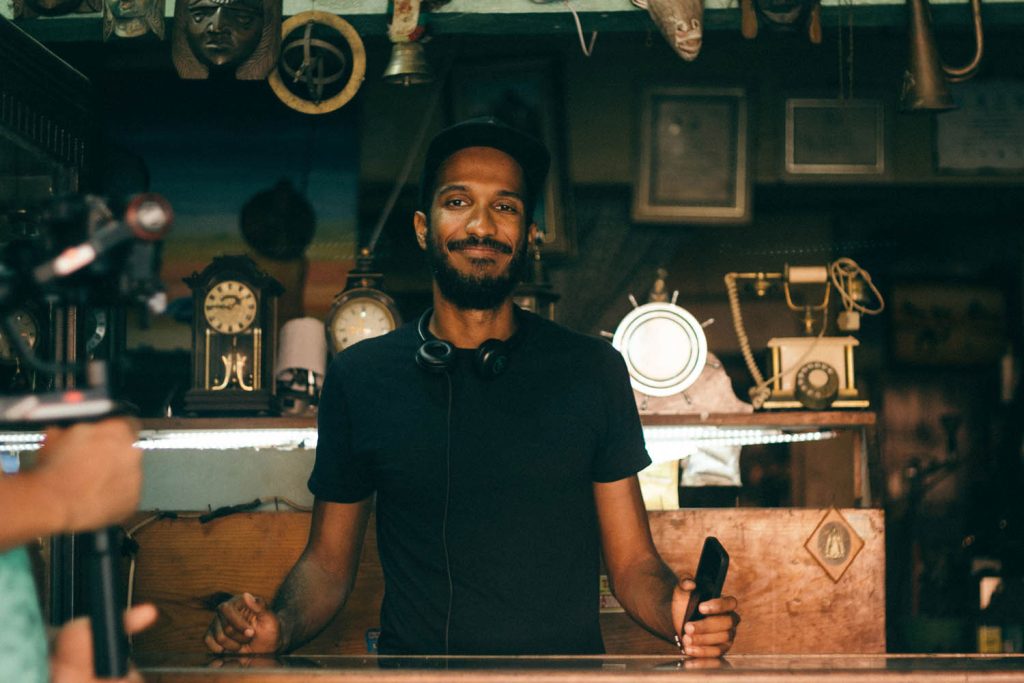Jonathan Ali talks to Yoel Morales, the Dominican (Republic) director of Bionico’s Bachata
Bionico is a crack addict on a mission. As his girlfriend, La Flaca, is set to come out of rehab, Bionico vows to turn over a new leaf and go clean himself.
With the help of the irrepressible Calvita, his best mate and fellow junkie, Bionico embarks on a series of ill-advised schemes so he can live with his love in domestic bliss — while a documentary crew captures his every move.
Set in a vibrant neighbourhood of Santo Domingo in the Dominican Republic, Bionico’s Bachata is an energetic and inventive movie. A fiction film with elements of the real, it flirts with the scatological while treating its subjects with respect — finding genuine moments of humour, pathos, and even grace in their often bleak situations.
Bionico is a memorably recognisable character, a figure on society’s fringes tirelessly battling the odds — harking all the way back to Charlie Chaplin and his iconic comic persona, the Little Tramp.
Jonathan Ali spoke with Bionico’s Bachata’s director Yoel Morales — who makes films as part of the creative collective Mentes Fritas — about their exuberant creation.
How did the film begin?
It began when we met the real Bionico and Calvita in 2016. What drew us in was the deep friendship they had and the cheerful way they carried themselves despite their difficult circumstances. As we spent time with them, we got to know the context from which they came, and we were very taken with the visual potential and the local identity that could be expressed through it.
The film is mockumentary — fiction, but in the form of a documentary. Why this form?
When I was starting out in filmmaking, I wanted to work in a more classical style, influenced by the aesthetics of the Coen brothers and other directors. However, whenever I tried, there was always something that bothered me; I felt everything was too manipulated. So I began leaning towards realism.
With Bionico, we attempted to write the script as standard fiction, but it didn’t convince us. We understood that there were many narrative rules to adhere to, and what we wanted was to be free to do whatever we wanted in both the script and the execution. We wanted to play with fiction and reality, mix everything, and create a unique space where we could push the limits to the maximum.
How did you cast Manuel Raposo, who plays Bionico?
I saw Manuel in a play, a stage adaptation of a tale by Dominican writer, and immediately knew he had to be Bionico. He was playing a peasant who had to earn the approval of his beloved’s father and fight for her. The way Manuel expressed his emotions — so sweetly and innocently, yet so nobly — was exactly the quality I wanted for Bionico.
Additionally, Manuel has a set of gestures that I’ve always found funny. I worked with him for a year to build the character, establish the tone, and, most importantly, the humour. The comedy had to arise from the situation without being deliberately sought out. It was also crucial that Manuel did not ridicule or caricature Bionico by falling into stereotypes.
You made the film with the community it’s set in. What was it like working with them?
The community was happy, not only because they were working on the project both in front of and behind the camera, but also because they identified with what we were filming. Many times, we would hear them say things like, “Now this is us; finally, it feels real.” When they felt something wasn’t quite right, they would intervene and teach us. I remember a guy in one of the scenes where Manuel had to smoke: he approached me to show me the stylish way to smoke the crack pipe correctly. He was obviously completely right.
Dembow music, an offshoot of reggaeton, is integral to the film’s soundtrack and style.
I am a big fan of dembow. It’s the most popular youth music and comes from the depths of the neighborhood. It has a unique creativity because it’s always in a phase of experimentation, where artists can literally make a dembow out of anything. We felt that what we wanted to achieve resembled a dembow song. We wanted the film to feel like it starts with an unruly dembow, and ends with a smooth bachata in an enramada (a bar in the countryside).
Bionico’s Bachata (2024)
Director: Yoel Morales
Dominican Republic • 80 minutes

